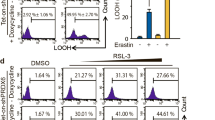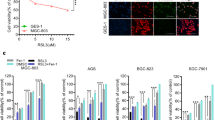Abstract
Ferroptosis is a newly discovered form of regulated cell death and characterized by an iron-dependent accumulation of lethal lipid reactive oxygen species (ROS), ferroptosis may exhibit a novel spectrum of clinical activity for cancer therapy. However, the significance of ferroptosis in the context of carcinoma biology is still emerging. Glycogen synthase kinase-3β (GSK-3β) has been found to be a fundamental element in weaking antioxidant cell defense by adjusting the nuclear factor erythroid 2-related factor 2 (Nrf2). In our study, decreased expression of GSK-3β was observed in the cancer tissues of breast cancer patients, results of immunohistochemistry indicated that Nrf2 was highly expressed in low-GSK-3β-expressed breast cancer tissues. The contributions of aberrant expression of GSK-3β and Nrf2 to the erastin-induced ferroptosis in breast cancer were further assessed, silence of GSK-3β blocked erastin-induced ferroptosis with less production of ROS and malondialdehyde (MDA) via upregulation of GPX4 and downregulation of arachidonate 15-lipoxygenase (Alox15), overexpression of GSK-3β enhanced erastin-triggered ferroptosis with elevated ROS and MDA. Enhanced erastin-induced ferroptosis by overexpression of GSK-3β was blocked by activating Nrf2. We further confirmed that overexpression of GSK-3β strengthened erastin-induced tumor growth inhibition in breast cancer xenograft models in vivo. In summary, our findings conclude that modulation the balance between GSK-3β/Nrf2 is a promising therapeutic approach and probably will be important targets to enhance the effect of erastin-induced ferroptosis in breast cancer.








Similar content being viewed by others
References
Jemal A, Bray F, Center MM et al (2011) Global cancer statistics. CA Cancer J Clin 61:69–90. https://doi.org/10.3322/caac.20107
Dixon SJ, Lemberg KM, Lamprecht MR et al (2012) Ferroptosis: an iron-dependent form of nonapoptotic cell death. Cell 149:1060–1072. https://doi.org/10.1016/j.cell.2012.03.042
Yi J, Minikes AM, Jiang X (2019) Aiming at cancer in vivo: ferroptosis-inducer delivered by nanoparticles. Cell Chem Biol 26:621–622. https://doi.org/10.1016/j.chembiol.2019.05.002
Kim SE, Zhang L, Ma K et al (2016) Ultrasmall nanoparticles induce ferroptosis in nutrient-deprived cancer cells and suppress tumour growth. Nat Nanotechnol 11:977–985. https://doi.org/10.1038/nnano.2016.164
Gai C, Yu M, Li Z et al (2020) Acetaminophen sensitizing erastin-induced ferroptosis via modulation of Nrf2/heme oxygenase-1 signaling pathway in non-small-cell lung cancer. J Cell Physiol 235:3329–3339. https://doi.org/10.1002/jcp.29221
Stockwell BR, Friedmann Angeli JP, Bayir H et al (2017) Ferroptosis: a regulated cell death nexus linking metabolism, redox biology, and disease. Cell 171:273–285. https://doi.org/10.1016/j.cell.2017.09.021
Jiang Y, Bao H, Ge Y et al (2015) Therapeutic targeting of GSK3beta enhances the Nrf2 antioxidant response and confers hepatic cytoprotection in hepatitis C. Gut 64:168–179. https://doi.org/10.1136/gutjnl-2013-306043
Phyu SM, Tseng CC, Smith TAD (2019) CDP-choline accumulation in breast and colorectal cancer cells treated with a GSK-3-targeting inhibitor. MAGMA 32:227–235. https://doi.org/10.1007/s10334-018-0719-3
Zhang A, Lakshmanan J, Motameni A et al (2018) MicroRNA-203 suppresses proliferation in liver cancer associated with PIK3CA, p38 MAPK, c-Jun, and GSK3 signaling. Mol Cell Biochem 441:89–98. https://doi.org/10.1007/s11010-017-3176-9
Chang LC, Chiang SK, Chen SE et al (2018) Heme oxygenase-1 mediates BAY 11–7085 induced ferroptosis. Cancer Lett 416:124–137. https://doi.org/10.1016/j.canlet.2017.12.025
Song MK, Lee JH, Ryoo IG et al (2019) Bardoxolone ameliorates TGF-beta1-associated renal fibrosis through Nrf2/Smad7 elevation. Free Radic Biol Med 138:33–42. https://doi.org/10.1016/j.freeradbiomed.2019.04.033
Conrad M, Angeli JP, Vandenabeele P et al (2016) Regulated necrosis: disease relevance and therapeutic opportunities. Nat Rev Drug Discov 15:348–366. https://doi.org/10.1038/nrd.2015.6
Yang WS, SriRamaratnam R, Welsch ME et al (2014) Regulation of ferroptotic cancer cell death by GPX4. Cell 156:317–331. https://doi.org/10.1016/j.cell.2013.12.010
Ni Chonghaile T, Sarosiek KA, Vo TT et al (2011) Pretreatment mitochondrial priming correlates with clinical response to cytotoxic chemotherapy. Science 334:1129–1133. https://doi.org/10.1126/science.1206727
Bebber CM, Muller F, Prieto Clemente L et al (2020) Ferroptosis in cancer cell biology. Cancers (Basel). https://doi.org/10.3390/cancers12010164
Shan X, Li S, Sun B et al (2020) Ferroptosis-driven nanotherapeutics for cancer treatment. J Control Release 319:322–332. https://doi.org/10.1016/j.jconrel.2020.01.008
Guan Q, Guo R, Huang S et al (2020) Mesoporous polydopamine carrying sorafenib and SPIO nanoparticles for MRI-guided ferroptosis cancer therapy. J Control Release 320:392–403. https://doi.org/10.1016/j.jconrel.2020.01.048
Theeuwes WF, Gosker HR, Langen RCJ et al (2017) Inactivation of glycogen synthase kinase-3beta (GSK-3beta) enhances skeletal muscle oxidative metabolism. Biochim Biophys Acta 1863:3075–3086. https://doi.org/10.1016/j.bbadis.2017.09.018
Ranea-Robles P, Launay N, Ruiz M et al (2018) Aberrant regulation of the GSK-3beta/NRF2 axis unveils a novel therapy for adrenoleukodystrophy. EMBO Mol Med. https://doi.org/10.15252/emmm.201708604
Yu J, Liu D, Sun X et al (2019) CDX2 inhibits the proliferation and tumor formation of colon cancer cells by suppressing Wnt/beta-catenin signaling via transactivation of GSK-3beta and Axin2 expression. Cell Death Dis 10:26. https://doi.org/10.1038/s41419-018-1263-9
Arioka M, Takahashi-Yanaga F, Kubo M et al (2017) Anti-tumor effects of differentiation-inducing factor-1 in malignant melanoma: GSK-3-mediated inhibition of cell proliferation and GSK-3-independent suppression of cell migration and invasion. Biochem Pharmacol 138:31–48. https://doi.org/10.1016/j.bcp.2017.05.004
Aristizabal-Pachon AF, Castillo WO (2017) Role of GSK3beta in breast cancer susceptibility. Cancer Biomark 18:169–175. https://doi.org/10.3233/cbm-160120
Zhu Q, Yang J, Han S et al (2011) Suppression of glycogen synthase kinase 3 activity reduces tumor growth of prostate cancer in vivo. Prostate 71:835–845. https://doi.org/10.1002/pros.21300
Shintoku R, Takigawa Y, Yamada K et al (2017) Lipoxygenase-mediated generation of lipid peroxides enhances ferroptosis induced by erastin and RSL3. Cancer Sci 108:2187–2194. https://doi.org/10.1111/cas.13380
Cuadrado A, Kugler S, Lastres-Becker I (2018) Pharmacological targeting of GSK-3 and NRF2 provides neuroprotection in a preclinical model of tauopathy. Redox Biol 14:522–534. https://doi.org/10.1016/j.redox.2017.10.010
Fan Z, Wirth AK, Chen D et al (2017) Nrf2-Keap1 pathway promotes cell proliferation and diminishes ferroptosis. Oncogenesis 6:e371. https://doi.org/10.1038/oncsis.2017.65
Roh JL, Kim EH, Jang H et al (2017) Nrf2 inhibition reverses the resistance of cisplatin-resistant head and neck cancer cells to artesunate-induced ferroptosis. Redox Biol 11:254–262. https://doi.org/10.1016/j.redox.2016.12.010
Armagan G, Sevgili E, Gurkan FT et al (2019) Regulation of the Nrf2 pathway by glycogen synthase kinase-3beta in MPP(+)-induced cell damage. Molecules 24:1377. https://doi.org/10.3390/molecules24071377
Funding
This work was supported by a grant from the National Natural Science Foundation of China (81572578) and The Natural Science Foundation of Shandong Province (ZR2015HL064).
Author information
Authors and Affiliations
Contributions
WL conceived and designed the experiments. XW, ZL, CG, DD and WC performed the experiments. FH analyzed the data. XW and ZL wrote the draft; WL checked and revised the draft. All authors approved to submit this version to this publication.
Corresponding author
Ethics declarations
Conflict of interest
The authors declare no conflicts of interest.
Additional information
Publisher's Note
Springer Nature remains neutral with regard to jurisdictional claims in published maps and institutional affiliations.
Rights and permissions
About this article
Cite this article
Wu, X., Liu, C., Li, Z. et al. Regulation of GSK3β/Nrf2 signaling pathway modulated erastin-induced ferroptosis in breast cancer. Mol Cell Biochem 473, 217–228 (2020). https://doi.org/10.1007/s11010-020-03821-8
Received:
Accepted:
Published:
Issue Date:
DOI: https://doi.org/10.1007/s11010-020-03821-8




